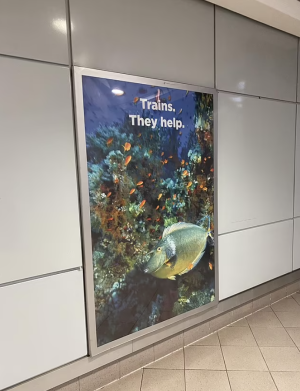Advertisement at train station baffles Aussies—can you decipher its meaning?
By
VanessaC
- Replies 6
The daily commute is a mundane routine for many, but for Sydney's Green Square railway station passengers, a peculiar advertisement has turned their journey into a guessing game.
The advertisement, featuring marine life, is accompanied by a cryptic three-word slogan: 'Trains. They help.'
This seemingly enigmatic message has left many commuters scratching their heads, sparking a lively debate on social media.
One bewildered commuter shared a photo of the advertisement on social media asking other users, 'What does this mean?'
The post quickly became a hot topic, with many users admitting they were equally stumped.
Some attempted to decipher the message, while others simply expressed their confusion over the advertisement’s unclear messaging.
However, amidst the sea of puzzled responses, a few Green Square regulars claimed they understood the poster's meaning.
'Trains [are] better for the planet, therefore better for sea life,' one wrote.
Despite this seemingly correct interpretation, not everyone was ready to accept this explanation.
Some commuters argued that the advertisement was too vague, criticising its copywriting.
'Nice idea, terrible copywriting,' one commented.
Others chose to see the lighter side of the situation, making humorous remarks about the advertisement's ambiguous meaning.
'Fish find trains handy for their daily commute,' one user joked.
While another quipped, 'When the train finally arrives, you'll be crammed like a sardine in a tin can.'
'Fish takes train every day. They're thankful and sponsored a poster,' a third added.
The advertisement, it seems, was intended to convey an environmental message, encouraging commuters to consider the ecological benefits of using public transport.
By choosing to take the train, commuters are reducing their carbon footprint, which in turn helps to protect marine life.
 Have you come across other puzzling advertisements? Share your experiences in the comments below.
Have you come across other puzzling advertisements? Share your experiences in the comments below.
The advertisement, featuring marine life, is accompanied by a cryptic three-word slogan: 'Trains. They help.'
This seemingly enigmatic message has left many commuters scratching their heads, sparking a lively debate on social media.
One bewildered commuter shared a photo of the advertisement on social media asking other users, 'What does this mean?'
The post quickly became a hot topic, with many users admitting they were equally stumped.
Some attempted to decipher the message, while others simply expressed their confusion over the advertisement’s unclear messaging.
However, amidst the sea of puzzled responses, a few Green Square regulars claimed they understood the poster's meaning.
'Trains [are] better for the planet, therefore better for sea life,' one wrote.
Despite this seemingly correct interpretation, not everyone was ready to accept this explanation.
Some commuters argued that the advertisement was too vague, criticising its copywriting.
'Nice idea, terrible copywriting,' one commented.
Others chose to see the lighter side of the situation, making humorous remarks about the advertisement's ambiguous meaning.
'Fish find trains handy for their daily commute,' one user joked.
While another quipped, 'When the train finally arrives, you'll be crammed like a sardine in a tin can.'
'Fish takes train every day. They're thankful and sponsored a poster,' a third added.
The advertisement, it seems, was intended to convey an environmental message, encouraging commuters to consider the ecological benefits of using public transport.
By choosing to take the train, commuters are reducing their carbon footprint, which in turn helps to protect marine life.
Key Takeaways
- Sydney commuters are puzzled by an ambiguous poster found at Green Square railway station that features sea life and the slogan 'Trains. They help.'
- Many found the advertisement too vague while others immediately guessed its intent.
- Eventually, it was clarified by users that the poster is conveying an environmental message: trains are better for the planet, thus better for marine life.








